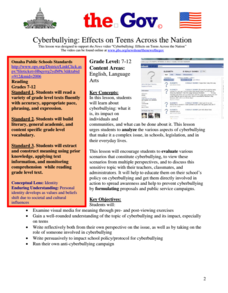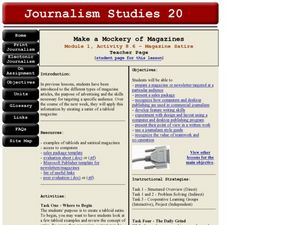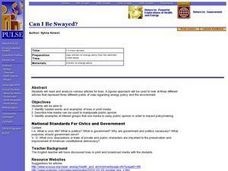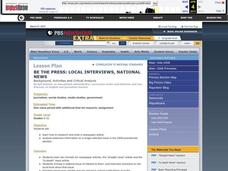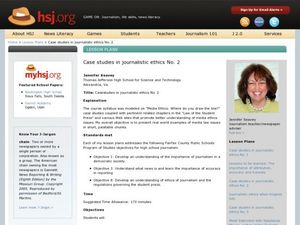PBS
Copyright and Fair Use
When is using someone else's copyrighted material appropriate? Learn about copyright and fair use with a lesson from PBS.org. Scholars read through a reference sheet about authors' rights and users' rights, and then create posters...
Curated OER
Cyberbullying: Effects on Teens Across the Nation (Segment 3)
Free speech, privacy, and cyberbullying are the focus of a series of activities that prompt class members to engage in discussions about these interrelated topics. They view a segment from PBS’s series on bullying, read...
Curated OER
Using News Broadcasts in Japan and the U.S as Cultural Lenses
Students view archives of news broadcasts in order to create a context of cultural understanding. They compare and contrast the news broadcasts in Japan and the United States.
Council for Economic Education
Satisfaction Please! (Part 2)
Simply understanding consumer rights may not help people solve their problems. Understanding who to turn to becomes key in many different scenarios. Teach the value of various organizations that fight for consumer rights through...
Curated OER
Make a Mockery of Magazines
Students examine tabloids. In this journalism lesson, students compare and contrast satirical magazines and then plan, write, and compile their own.
Curated OER
Writing a Newspaper Article
The perfect resource for a beginning journalism teacher or someone designing a journalism unit, this activity prompts learners to write a newspaper article. It covers all aspects of the writing process, such as a guided warm-up...
Curated OER
Contraceptives and conscience
High schoolers read The New Republic article and/or watch the News Ohio streaming video package. They employ a wide range of strategies as they write and use different writing process elements appropriately to communicate with different...
iCivics
Lesson 2: Misinformation
Fake news is a hot topic right now ... but what is it? Intrepid young investigators track down the facts that separate journalistic mistakes and misinformation through reading, research, and discussion. Part three in a five-lesson series...
Stanford University
Hurricane Katrina
The adage says that journalism is the first draft of history. How should people evaluate these sources of information? Taking into account various sources, including those from various perspectives and different creators, learners...
Media Smarts
Selling Tobacco
Take a look at tobacco advertising techniques through the decades. Students analyze the differences in strategies, and write an essay on the advertising history of one brand of tobacco, how tobacco advertising has changed over time, or...
Media Smarts
Violence on Television
Focus on a specific incident of violence on television in the case of the Canadian Broadcast System showing Silence of the Lambs on public television. Look at the broadcasting codes and a complaint that was filed against the Association....
Curated OER
Can I Be Swayed?
Students identify loaded words and examples of bias in print media. They describe how media can be used to manipulate public opinion. Students identify examples of interest groups that use media to sway public opinion in order to impact...
Curated OER
Americas Idols
Students engage in a lesson that is concerned with the concept of American Idol and the controversy that surrounds the broadcast. They conduct research using a variety of resources and write paragraphs that state opinions about the...
PBS
Be the Press: Local Interviews, National News
High school learners research an issue that is important to them and apply the research to write a newspaper article. After thoroughly researching their topic, high schoolers strengthen research, analyzation, and writing...
Curated OER
This Just in! Nile Network News Update
Have your young reporters research contributions of the ancient Egyptians, draft scripts, and broadcast their stories live on the Nile Network News. Depending on class size and age, topics may be brainstormed or assigned. The detailed...
Media Education Lab
Sponsored Content as Propaganda
What is sponsored content? Who produces sponsored content? Why? Is it fair or unfair? What are the privacy implications for consumers? To answer these questions, class members view a model screencast before crafting their own that...
Social Media Toolbox
Cyberbullying
What can we do to make our school community more aware of cyberbullying? From The Social Media Toolbox, lesson 10 of 16 takes on the tough topic of bullying. Learners research cyberbullying through online research, then create an...
Media Smarts
Looking at Newspapers: Introduction
A scavenger hunt introduces class groups to the different sections of newspapers and the different types of articles found in each section.
Curated OER
The War of the Worlds
Young scholars discover the concept of media based on literature. In this War of the Worlds lesson, students read the novel The War of the Worlds by H.G. Wells and listen to the 1938 radio broadcast adaptation by Orson Welles. Young...
Curated OER
World War II Multimedia Newscast: History, Technology, Journalism
Students compose a multi-media newscast on various subjects relating to WWII to demonstrate their knowledge and ability to research.
Curated OER
The Whole World is Watching: Iran, 2009
Students study the impact of social media. In this Iranian election lesson, students examine the outcome of the 2009 election and the public protests that followed it. Students determine how citizen journalism informed people around the...
Curated OER
A Pixie Biography Report
Students practice biographical writing after completing research on the subject. In this journalism lesson, students read a story of an important person's life and discuss the important moments along the way. Students utilize...
Curated OER
Facing War
Students visit two sites about World War II. These sites show how war can impact a nation and how people have coped with life during years of war. Particular attention is paid to how the media covers the current war in Iraq.
Curated OER
Case Studies in Journalistic Ethics No. 2
Learners use texts on media ethics and various Web sites to explore real world examples of media law issues. For this media ethics activity, students examine the Food Lion case using a transcript from the...



